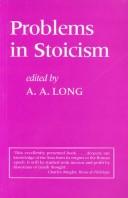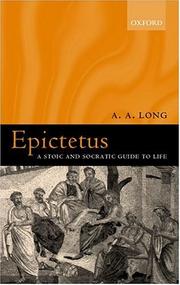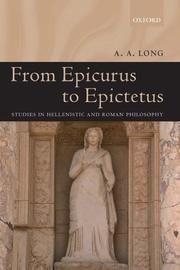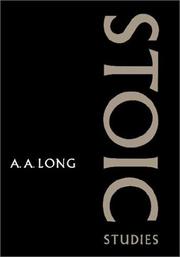| Listing 1 - 10 of 41 | << page >> |
Sort by
|

ISBN: 048512128X 9780485121285 Year: 1996 Publisher: London Athlone
Abstract | Keywords | Export | Availability | Bookmark
 Loading...
Loading...Choose an application
- Reference Manager
- EndNote
- RefWorks (Direct export to RefWorks)
Philosophy of nature --- History of philosophy --- General ethics --- Antiquity --- Stoics --- Stoïcisme --- Stoïcisme

ISBN: 0199245568 0191597929 0199268851 9786611944155 1281944157 0191529710 9780199268856 9780199245567 Year: 2002 Publisher: Oxford Clarendon
Abstract | Keywords | Export | Availability | Bookmark
 Loading...
Loading...Choose an application
- Reference Manager
- EndNote
- RefWorks (Direct export to RefWorks)
Epictetus --- Stoics. --- Stoïcisme --- Epictetus. --- Ėpiktet --- Epiktit --- Epitteto --- Epiktétos --- Epictète --- Epicteto --- Ἐπίκτητος --- Epiktetos --- Stoïcisme --- Epiktet
Book
ISBN: 9780674729032 067472903X 0674735919 0674967348 9780674735910 9780674967342 Year: 2014 Publisher: Cambridge, Massachusetts Harvard University Press
Abstract | Keywords | Export | Availability | Bookmark
 Loading...
Loading...Choose an application
- Reference Manager
- EndNote
- RefWorks (Direct export to RefWorks)
This lively book offers a wide-ranging study of Greek notions of mind and human selfhood from Homer through Plotinus. A. A. Long anchors his discussion in questions of recurrent and universal interest. What happens to us when we die? How is the mind or soul related to the body? Are we responsible for our own happiness? Can we achieve autonomy? Long asks when and how these questions emerged in ancient Greece, and shows that Greek thinkers’ modeling of the mind gave us metaphors that we still live by, such as the rule of reason or enslavement to passion. He also interrogates the less familiar Greek notion of the intellect’s divinity, and asks what that might mean for us. Because Plato’s dialogues articulate these themes more sharply and influentially than works by any other Greek thinker, Plato receives the most sustained treatment in this account. But at the same time, Long asks whether Plato’s explanation of the mind and human behavior is more convincing for modern readers than that contained in the older Homeric poems. Turning to later ancient philosophy, especially Stoicism, Long concludes with an exploration of Epictetus’s injunction to live life by making correct use of one’s mental impressions. An authoritative treatment of Greek modes of self-understanding, Greek Models of Mind and Self demonstrates how ancient thinkers grappled with what is closest to us and yet still most mysterious—our own essence as singular human selves—and how the study of Greek thought can enlarge and enrich our experience.
Mind and body --- Philosophy of mind. --- Self (Philosophy) --- Soul. --- Philosophy, Ancient. --- Esprit et corps --- Philosophie de l'esprit --- Moi (Philosophie) --- Ame --- Philosophie ancienne --- Ancient philosophy --- Greek philosophy --- Philosophy, Greek --- Philosophy, Roman --- Roman philosophy --- Pneuma --- Future life --- Philosophical anthropology --- Theological anthropology --- Animism --- Spirit --- Philosophy --- Mind, Philosophy of --- Mind, Theory of --- Theory of mind --- Cognitive science --- Metaphysics --- Body and mind --- Body and soul (Philosophy) --- Human body --- Mind --- Mind-body connection --- Mind-body relations --- Mind-cure --- Somatopsychics --- Brain --- Dualism --- Holistic medicine --- Mental healing --- Parousia (Philosophy) --- Phrenology --- Psychophysiology --- Self --- Psychological aspects --- Self (Philosophy). --- History of philosophy --- Greece --- Mind and body. --- Philosophy of mind --- Soul --- Philosophy, Ancient
Book
ISBN: 0485137062 Year: 1968 Publisher: London : Athlone,
Abstract | Keywords | Export | Availability | Bookmark
 Loading...
Loading...Choose an application
- Reference Manager
- EndNote
- RefWorks (Direct export to RefWorks)
Sophocles --- Mythology, Greek, in literature. --- Greek language --- Rhetoric, Ancient. --- Drama --- Tragedy. --- Noun. --- Technique. --- Sophocles.

ISBN: 0485111187 9780485111187 Year: 1971
Abstract | Keywords | Export | Availability | Bookmark
 Loading...
Loading...Choose an application
- Reference Manager
- EndNote
- RefWorks (Direct export to RefWorks)
Stoics --- 141.131 --- -Ethics --- Philosophy, Ancient --- Platonisme. Neoplatonisme --- Addresses, essays, lectures --- Stoics. --- -Platonisme. Neoplatonisme --- 141.131 Platonisme. Neoplatonisme --- Ethics
Book
ISBN: 0715606670 0715612387 9780715612385 9780715606674 Year: 1986 Publisher: London Duckworth
Abstract | Keywords | Export | Availability | Bookmark
 Loading...
Loading...Choose an application
- Reference Manager
- EndNote
- RefWorks (Direct export to RefWorks)
Stoics --- Skeptics (Greek philosophy) --- Epicurus --- Ethics --- Philosophy, Ancient --- Stoics. --- Epicureans (Greek philosophy) --- Epicurus. --- Skeptics (Greek philosophy). --- Epicureans (Greek philosophy). --- Stoïcisme --- Scepticisme --- Epikuros --- Ėpikur --- Epiḳoros --- Epicuro --- Epikouros --- Abīqūr --- Yibijiulu --- Epicure --- Epʻikʻurosŭ --- Έπίκουρος --- 1 <38> --- 1 <38> Griekse filosofie --- Griekse filosofie --- History of philosophy --- Antiquity --- Philosophy, Ancient. --- Skepticism --- Philosophie ancienne --- Stoïcisme --- Ἐπίκουρος

ISBN: 0199279128 9780199279128 019927911X 9780199279111 0191706760 1281145521 9786611145521 1435619390 0191535389 9781435619395 9780191706769 9780191535383 6611145524 9781281145529 Year: 2006 Publisher: Oxford Clarendon
Abstract | Keywords | Export | Availability | Bookmark
 Loading...
Loading...Choose an application
- Reference Manager
- EndNote
- RefWorks (Direct export to RefWorks)
Long, one of the world's leading writers on ancient philosophy presents 18 essays on the philosophers and schools of the Hellenistic and Roman periods. The discussion ranges over four centuries of innovative and challenging thought in ethics and politics, psychology, epistemology, and cosmology.
Philosophy, Ancient. --- Skepticism. --- Stoics. --- Epicurus. --- Philosophie ancienne --- Scepticisme --- Stoïcisme --- Philosophy, Ancient --- Skepticism --- Stoics --- Ethics --- Scepticism --- Unbelief --- Agnosticism --- Belief and doubt --- Free thought --- Ancient philosophy --- Greek philosophy --- Philosophy, Greek --- Philosophy, Roman --- Roman philosophy --- Epikuros --- Ėpikur --- Epiḳoros --- Epicuro --- Epikouros --- Abīqūr --- Yibijiulu --- Epicure --- Epʻikʻurosŭ --- Έπίκουρος --- Epicurus --- Ἐπίκουρος

ISBN: 0521482631 Year: 1996 Publisher: Cambridge Cambridge University press
Abstract | Keywords | Export | Availability | Bookmark
 Loading...
Loading...Choose an application
- Reference Manager
- EndNote
- RefWorks (Direct export to RefWorks)
Stoics --- Ethics --- Philosophy, Ancient --- Stoics. --- Ethics, Ancient --- Stoïcisme --- Morale ancienne

ISBN: 0521446678 0521441226 9780521446679 9780521441223 9781139000734 Year: 2005 Publisher: Cambridge Cambridge University Press
Abstract | Keywords | Export | Availability | Bookmark
 Loading...
Loading...Choose an application
- Reference Manager
- EndNote
- RefWorks (Direct export to RefWorks)
History of philosophy --- Antiquity --- #A0109W --- 1 <38> --- 1 <38> Griekse filosofie --- Griekse filosofie --- Greece --- Philosophy, Ancient. --- Philosophy, Ancient --- Philosophie ancienne --- Philosophy [Ancient ]
Book
ISBN: 9780691177717 0691177716 Year: 2018 Publisher: Princeton Princeton University Press
Abstract | Keywords | Export | Availability | Bookmark
 Loading...
Loading...Choose an application
- Reference Manager
- EndNote
- RefWorks (Direct export to RefWorks)
"Born a slave, the Roman Stoic philosopher Epictetus (c. 55-135 AD) taught that mental freedom is supreme, since it can liberate one anywhere, even in a prison ... Freedom, for Epictetus, is not a human right or a political prerogative but a psychological and ethical achievement, a gift that we alone can bestow on ourselves ... How to Be Free features splendid new translations and the original Greek on facing pages, a compelling introduction that sets Epictetus in context and describes the importance of Stoic freedom today, and an invaluable glossary of key words and concepts. The result is an unmatched introduction to this powerful method of managing emotions and handling life's situations, from the most ordinary to the most demanding."--Provided by the publisher.
Stoics. --- Epictetus --- Epictetus. --- Selections.
| Listing 1 - 10 of 41 | << page >> |
Sort by
|

 Search
Search Feedback
Feedback About UniCat
About UniCat  Help
Help News
News